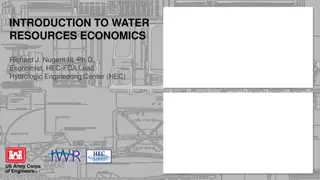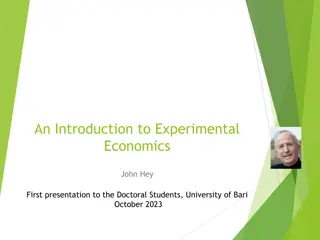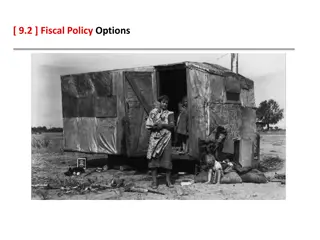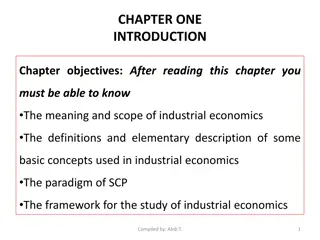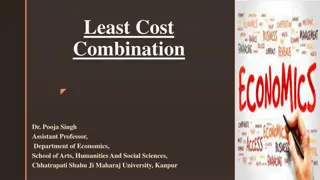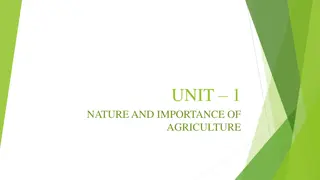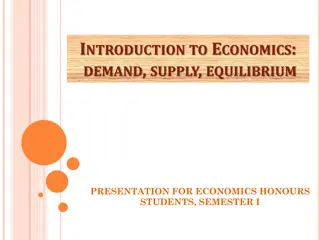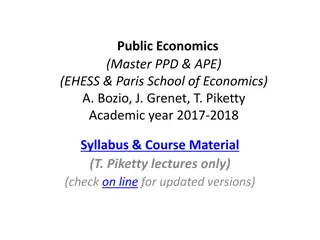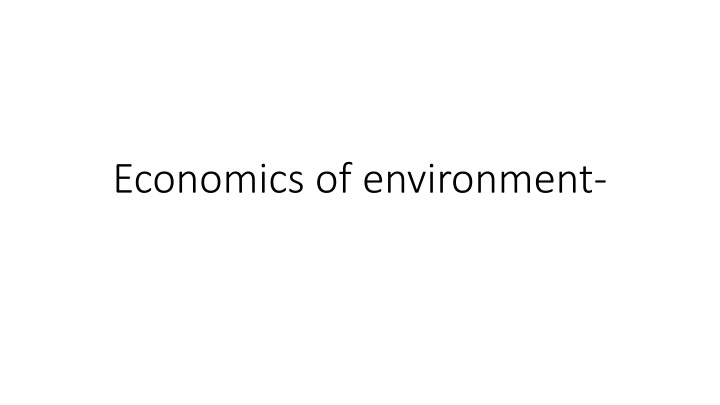
The Economics of the Environment and its Interlinkages
Environmental economics explores the economic impacts of environmental policies, while natural resources and environmental resources play crucial roles in the economy. The interplay between the economy and environment involves resource extraction, waste production, and ecological services. There exists a trade-off between economic output and environmental quality, illustrated by the production possibility curve.
Download Presentation

Please find below an Image/Link to download the presentation.
The content on the website is provided AS IS for your information and personal use only. It may not be sold, licensed, or shared on other websites without obtaining consent from the author. If you encounter any issues during the download, it is possible that the publisher has removed the file from their server.
You are allowed to download the files provided on this website for personal or commercial use, subject to the condition that they are used lawfully. All files are the property of their respective owners.
The content on the website is provided AS IS for your information and personal use only. It may not be sold, licensed, or shared on other websites without obtaining consent from the author.
E N D
Presentation Transcript
Environmental economics- Environmental economics is a sub field of economics that is concerned with environmental issues. According to the national bureau of economic research environmental economics undertakes theoretical or empirical studies of the economic effects of national or local environmental policies around the world. The particular issues include the costs and benefits of alternative environmental policies to deal with air pollution, water quality, toxic substances, solid waste management and global warming.
Environmental and natural economics- It is the application of the principles of economics to the study of how environmental and natural resources are developed and managed. Natural resources- resources provided by nature that can be divided into increasingly smaller units and allocated at margin. Environmental resources- resources provided by nature that are indivisible. Natural resources serve as inputs to the economic system. Environmental resources are affected by the system. (e.g. pollution)
Economy environment interlinkages- The environment both biological and physical is the source of all natural resources. Some natural resources are renewable while others are non renewable. The economy consists of two sectors producers and consumers. Exchange of goods and services takes place between the two sectors. The production sector extracts energy and material resources from the environment which are then transformed into finished goods. The transformation process generates a huge amount of waste. There is a certain amount of recycling but all waste is not recycled and a certain amount is absorbed by the environment.
Functions of the environment- 1) The environment supplies renewable and non renewable resources. 2) The environment assimilates waste by either absorbing waste or dispersing waste. 3) The environment provides life support services by maintaining ecological balance and genetic diversity. 4) The environment provides natural services such as aesthetic enjoyment and recreation.
Trade off between conventional economic output and environmental quality- It is not possible for a country to maximize both its environmental protection and its economic output. This trade off can be analyzed with the help of production possibility curve. The production possibility frontier shows the opportunity cost of choosing either more environmental protection or more economic output
At the far left of the graph at point P a country would be selecting a high level of economic output but very little environmental protection. At the other extreme point T a country would be selecting a high level of environmental protection but little output.
What is economic efficiency- Economic efficiency implies an economic state in which every resource is optimally allocated to serve each individual or entity in the best way while minimizing waste and inefficiency. When an economy is economically efficient any changes made to assist one entity would harm another. In terms of production goods are produced at their lowest possible cost as are the variable inputs of production.
Social efficiency- Social efficiency occurs at a output where marginal social benefit (MSB )is equal to the marginal social cost (MSC) social efficiency is closely related to the concept of Pareto efficiency. A point where it is impossible to make anyone better off without making someone worse off. Social benefit = private benefit + external benefit Social cost = private + external cost

